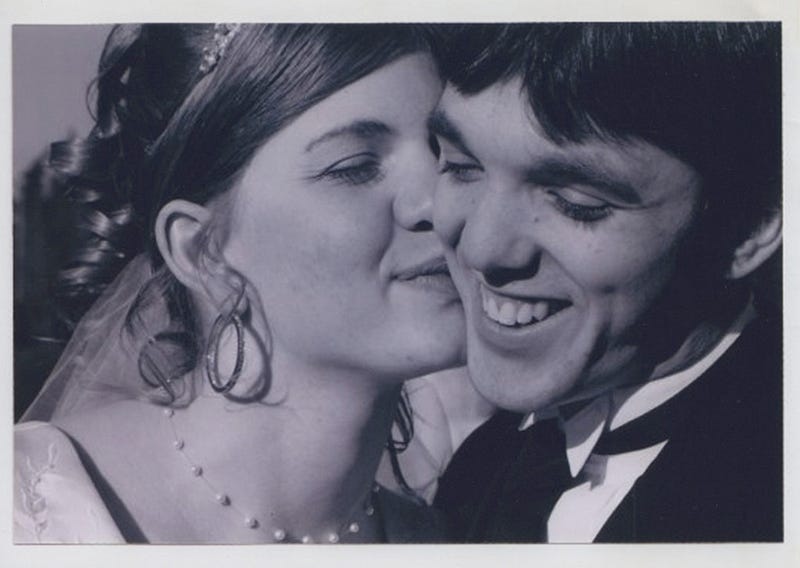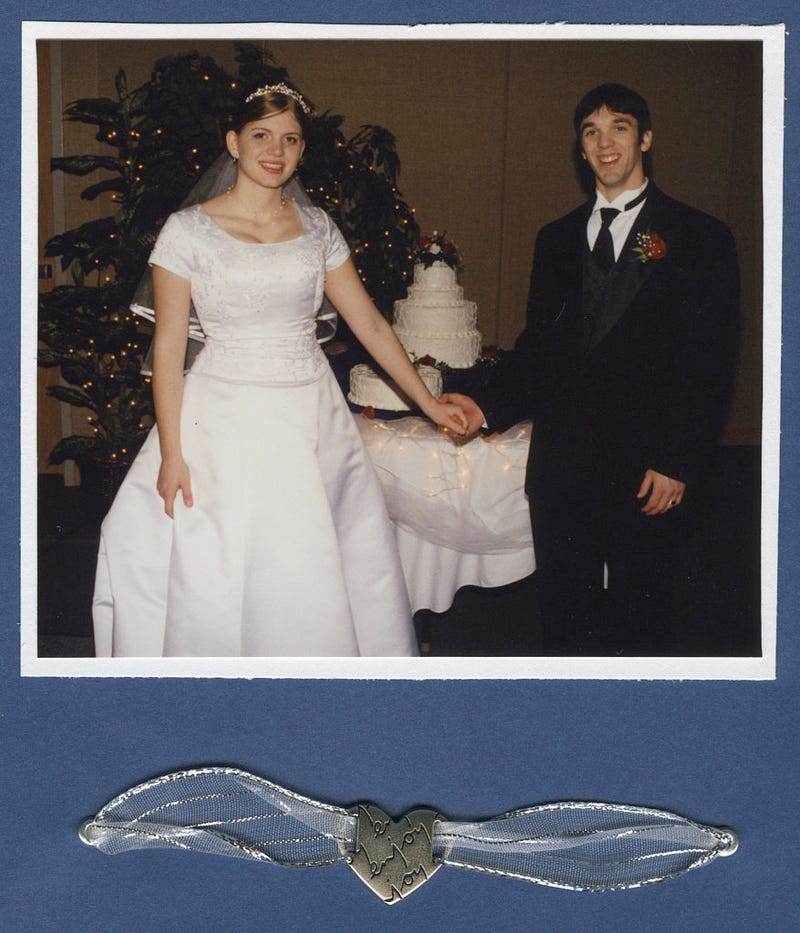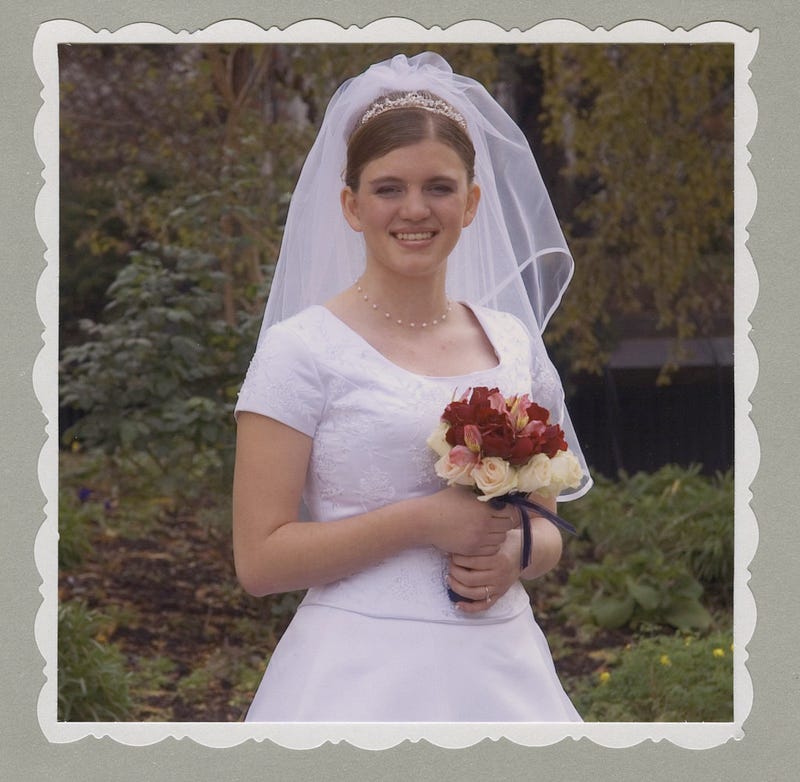A Question of Faith
Klipsun writer Becky Campbell’s journey through and out of the Mormon Church
STORY AND COURTESY PHOTOS BY BECKY CAMPBELL | ADDITIONAL PHOTOS BY GENEVIEVE CARRILLO
“You may now kiss the bride”
These were not the six words I heard as I knelt across a cream-colored altar in plain white ceremonial garb marrying a man I had known for only six months.
The words that I heard at the small intimate ceremony, which most of my family were not allowed to attend, are considered sacred outside the confines of the temple and cannot be printed without fear of retaliation.
Fast-forward to more than a decade later in the coastal city of Bellingham, Washington, and there are several dozen different churches. Only one of them belongs to my former faith, the Church of Jesus Christ of Latter-day Saints, or more commonly known, the Mormon church.
The campus of Western Washington University resides in Bellingham and is almost always buzzing with students rushing to-and-from classes, but if you look closely, your eyes might catch the flash of a bright white dress shirt and a black name tag slipped snugly into the breast pocket proclaiming the individual an ‘Elder’. These missionaries, despite their youth, have come to preach about what the founder of their faith called, “…the most correct of any books on earth.”

As I watch these young boys who are at least a decade younger than I, my mind wanders off onto those long abandoned pathways of indoctrination and belief that this now tattooed, pierced, atheist and exMormon comes from.
My personal journey began in the year 1985 but the events that set my story in motion started 185 years ago. In 1830, Joseph Smith, Jr., who claimed fantastical visions and religious proclamations, including a new book of scripture, The Book of Mormon, founded the Mormon Church. From that day on the Mormon Church began to spread its way around the world and to more than 160 countries. Along the way, it has boasted the disputed membership claim of over 15-million adherents. Many of which remain unaware.
My story started, as many Mormon’s stories do, when I was born to my actively practicing mother and father — along with my younger sister and two younger brothers. I dutifully attended church services without question as a child and was present at hundreds of hours of religious meetings, including three-hour long weekly Sunday services. The formative years of my childhood were spent immersing myself in the teachings and doctrines of my church. It wasn’t until my parents moved our family to Salt Lake City, near my freshman year of high school, that a shift began to take place.
There are certain restrictions or “commandments” that one must follow in order to be considered a worthy Mormon. These rules cover every aspect of life from dating habits, diet, attire and sexuality.
No coffee, tea or alcohol is allowed. Clothing must be modest, flaunting nothing above the knees or below the shoulders.
Dating starts at age 16 and it is encouraged to group date until adulthood. Premarital sex and same-sex relationships are considered sinful.
Tattoos, extreme hairstyles and more than one piercing for females are banned. To be considered a good, contributing Mormon means paying a 10 percent monetary offering of your gross income to the church.
The result of these confining rules, I believe, is a culture of guilt and pressure reflected within the LDS Church and schools. The honor code of Brigham Young University (BYU), a privately owned Mormon university, states that as a Mormon you are implored to, “…Encourage others in their commitment to comply with the Honor Code,” or as what one former student, who wishes not to be named, calls “tattling.”
The invasive nature of Mormon culture doesn’t just lie within its own church walls. A “nevermo” (never Mormon) or exMormon living in Utah will likely end up with a somewhat Mormon adgenda through state and government policies, education and healthcare.
After two years in this Orwellian type setting, my “shelf” of belief began to shake.

On a night during my junior year in high school, my unhappiness with the way of life I was being forced to live became overwhelming. I sat my parents down and told them that I no longer believed in a core doctrine of Mormonism, that Joseph Smith was a prophet; a statement that, once uttered by any Mormon, will start to cast an apostate shadow of disbelief.
In the year that followed everything I did, from the clothing I wore to what I ate were carefully and sometimes even secretly observed by my parents, church leaders and, as I found out after the fact, my best friends.
I didn’t know who I could trust.
My thirst for perspective was strong and I began to research what other religions had to offer so I checked out a few books on paganism from the library. As I brought them home, I made sure to hide them under my mattress so my parents wouldn’t find out.
I went away on holiday break shortly after and came home to a spotless room, noticing that my bed had been made, which meant only one thing — my mother had found the forbidden literature.
The proof was taped to the back of my door in the form of a pearly white library checkout slip. In my mothers unmistakable curly-cue handwriting were the words, “We do NOT read these types of books in this house.”
This proclamation ripped the air from my lungs and left my mind reeling. My worst fears were confirmed. I had no privacy. I had no choices. No matter what I did, my parents would find out.
It was at that moment that I knew what I had to do.
Brainwashing oneself back into a religious belief was no easy task. From graduating seminary (daily academic religious study), receiving my Young Women’s medallion (an award given to females 12–18 for completing certain spiritual tasks), attending the Mormon university that both my parents graduated from and marrying a worthy Mormon man in the temple, I slowly conditioned myself back to belief at the expense of my happiness.
Married at the inexperienced age of 19 to my first-and-only boyfriend, I pushed on with my “shoulder to the wheel”, living with passion for my re-found religious faith.
I immersed myself in every type of religious study I could get my hands on. In addition to the required religious doctrine courses at university, I participated in daily scripture study and weekly spiritual devotionals. Trying to convince myself that I was a good Mormon wife, I did everything that one Mormon prophet said would make me “…happy about [my] circumstances,” because it would “…bring me peace and contentment” — but it wasn’t enough.
A few years into my marriage, my mental “shelf” cracked beyond repair and everything came tumbling down. During the middle of a school day, I received an urgent phone call from my mother.
“Your sister told us she is a lesbian and an atheist,” my mother stated flatly.
I couldn’t speak. Two dreaded words had been spoken by one of my own kin, two words that no Mormon ever wants to hear about their own children, siblings or spouse — “atheist” and “gay”.
Over the next several months I saw my sister, one of my best friends, become a “sinner” in my mind and beliefs. Relegating her to the darkest and deepest corners of hell, I was confused over her choice or what I thought was her choice, to become a lesbian.
How could my sister be “evil,” “unclean” or a “sinner”? The prophetic words of my faith failed me. They in no way described the young woman who I had lived with my entire life and knew to be a good human being.
For the second and last time, I began to question the teachings of the Mormon church.
It started out slowly but my friends, co-workers and extended family noticed the small and somewhat subtle adjustments in my life that were due to my blossoming disbelief.
“You are a cheat, a liar, a thief — failure and disappointment,” were my Grandfathers words to me.
The animosity did not reach its peak until 2008 when I became more outspoken about my lack of belief in the Church. During this time of personal turmoil and belief upheaval, individuals who I considered close friends took it upon themselves to call me back into the fold of our faith with spiteful admonishments like, “You are in a league with Lucifer himself,” or call me a, “hateful little monster.”
The toll of their hostility at my choices began to psychologically break me down and I began distancing myself from anyone or anything dealing with Mormonism.
Over the last seven years, countless friendships were ended purely on the fact that I was no longer a Mormon. Official resignation from the Mormon church means I’ve been able to come full-circle with my grief and acceptance of losing what was my way of life and the insular community I was raised in.
No longer can I rely on members of the Mormon church to support me by any means because our beliefs are opposite.

As my memories fade and return to the present I watch these missionaries at Western with a sense of nostalgia for my past but I’ve held on to a firm declaration that I could never turn to the church that restricted my life completely.
Happily finishing up my senior year as an undergrad at a well-respected state university, I couldn’t imagine my life any better. My career choices have brought me to a field that I enjoy, my friends and family stuck around because they care about me and I continue to stand beside the man that, 11-years-ago, became my husband.
